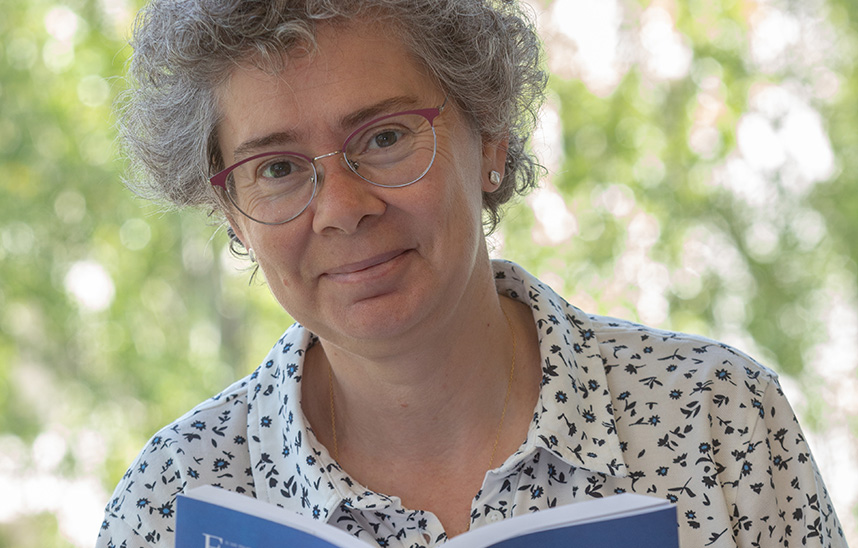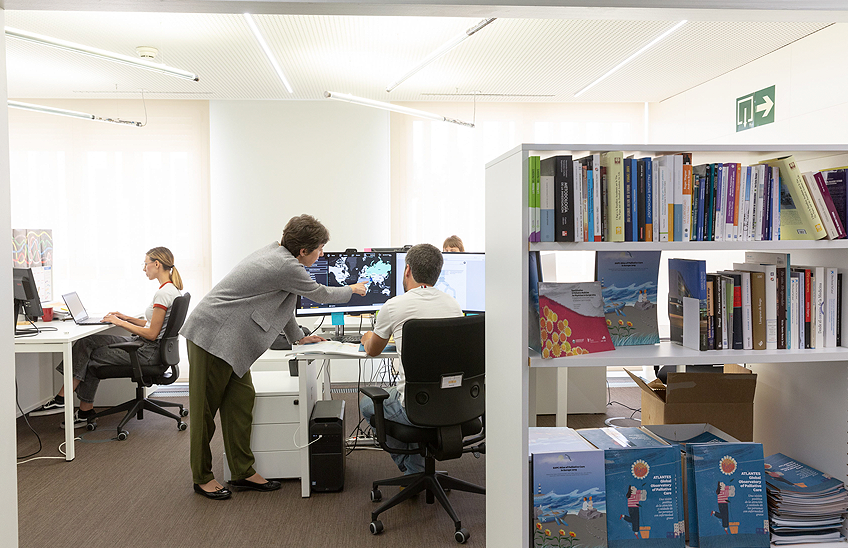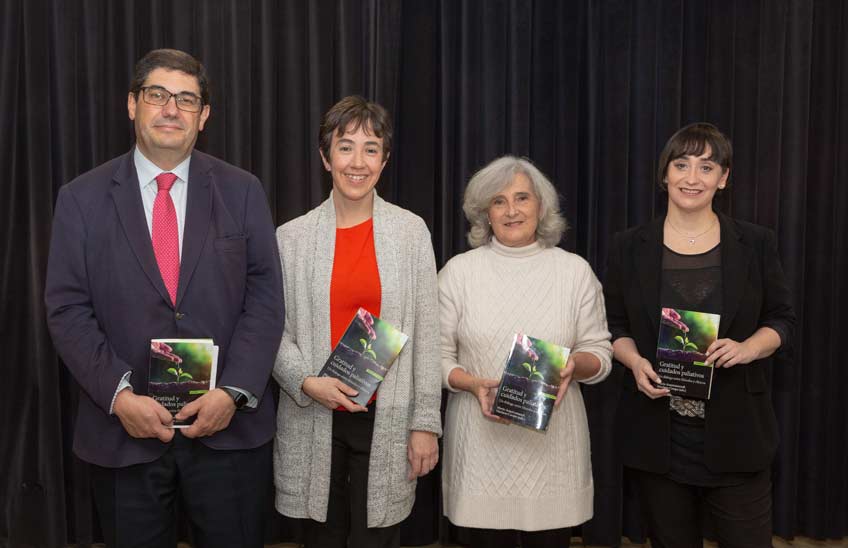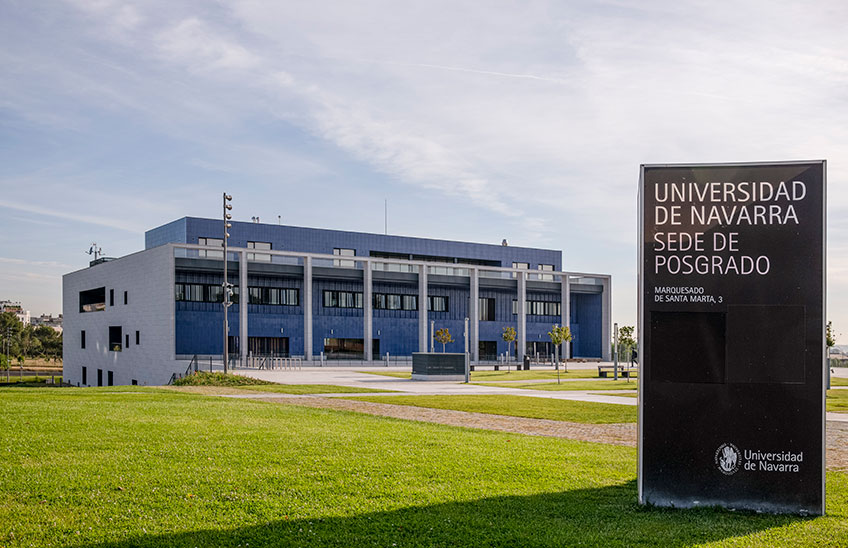2023_10_04_FYL_ana_marta
Ana Marta González, professor at Philosophy: "We are witnessing a crisis of work: for many people it is no longer the privileged place from which to articulate their development staff and social".

Philosophy In her latest publication, work, Sentido y development, Ana Marta González, professor at School and researcher at the ICS of the University of Navarra, reflects on the meaning of work, which is going through a moment of crisis. A moment in which, according to the academic, people live the work only in core topic of need or in a narcissistic way, disconnected from the dimension of service by which the work contributes to the social development . The publication is part of the line of research work ,care, development that is part of the Strategy 2025 of the University of Navarra.
How does technology influence the work? What have been the consequences of the pandemic? What role should organizations and companies play? Has the work ceased to be the fundamental axis to articulate the development staff and social of the person? Ana Marta Gonzalez analyzes these and other questions from a philosophical perspective. "The lack of a human and humanizing vision of work leads people to look for humanity elsewhere -for example, in various leisure activities- and fractures in people's lives," she says.
What is the goal of this book?
The goal of this book is to reflect on the meaning of work at a time when it is in crisis. The aim is to highlight the extent to which work structures human life from both an individual and social point of view.
Why do you say that the sense of work is in crisis? What are the warning signs?
The crisis goes back a long way. But the precariousness of the conditions of work, and more recently, the post-pandemic status has exacerbated it. After the pandemic in the USA, a phenomenon called The great resignation was experienced, which spread to other European countries, a phenomenon whereby people show no special interest in working. As if there had been a disenchantment, a disconnection, with respect to the possibilities of development staff and social offered by work. For many people, the work has ceased to be the privileged place from which to articulate their development staff and social.
Has the pandemic generated this lack of motivation at work?
Yes, but it is more than a lack of individual motivation. Today we live the work, either in core topic of necessity - "there is no choice but to work to live"-, or in core topic of self-realization, somewhat "narcissistic", because it appears disconnected from the dimension of service by which the work contributes to the social development . Both approaches are partial. What is certain is that work has a profound human meaning, which goes beyond economic needs, and in which there are not only individual but also social dimensions, quotation . To see work itself in core topic of service is core topic.
How has technology influenced people's work ? The line that separates our professional and work life is becoming more and more blurred and we are continuously connected: mail, whatsapp, etc.
Yes, in this aspect it seems that we have regressed with respect to one of the main achievements of modern society: to create a space of "life staff" differentiated from the "life of work". I think, however, that not only for reasons of health, but also of vital integrity, it is important to know how to remove oneself from the dynamics of performance and production and to discover the meaning of what is free and, as Hartmut Rosa would say, of what is "unavailable". For this, it seems to me, individual commitment is not enough: precisely because we are social, we must socially preserve certain times and spaces that are not governed by the logic of production. Today everyone has their office in their pocket, and that is not financial aid. Along these lines, the experience of teleworking during the pandemic has been very ambivalent: it is still not possible to draw a clear conclusion. Teleworking brought flexibility, but also an increase in productivity that invaded spheres.
Has teleworking contributed to the crisis of the sense of work, to the disconnection to which reference letter refers?
It is no coincidence that 'the great resignation' took place after the pandemic. In work many more dimensions than the purely economic one are at stake. When an environment of work is pleasant and favors the deployment of one's own abilities and creativity, it is experienced as something enriching, not only because you get a salary but also because you develop as a person. The increase in teleworking during the pandemic has highlighted the human costs of a purely productive vision of work. Of course there has to be productivity at work but at any cost?
Is this loss of the sense of work understood as a space for enrichment staff and social enrichment the cause of the mental health problems that increasingly afflict a larger part of society?
I am not a psychologist but I would not be surprised. The work structures our lives in a very profound way. Beyond the economic aspect, the work, as a human reality, on whose meaning we reflect, can and should be experienced as a platform for growth staff, as a certain way of contributing to the society of which we are a part; in this sense, it constitutes a natural place of social integration, in which growth staff cannot be separated from the dimension of service. It is clear from the book that if the work is out of place, the whole of life suffers, because the work is the natural place where, in principle, the cultivation of one's own abilities and the contribution to social life occur quotation .
Is a change of mentality necessary in organizations, in companies?
It is necessary for companies to promote measures that help everyone to see their own work as a place where quotation development staff and social factors take place. Sometimes we talk about the humanization of work and we limit ourselves to physical factors, which are undoubtedly important, such as space, light, ventilation, etc. These issues must be taken care of, but there is another humanization factor that is even more important, which is taking into account the relational dimension of the person: if workers can come to work every day it is because they have families to take care of them and vice versa. We must aim for a kind of ecosystem between families and companies that is sustainable: if this ecosystem works well, society benefits.
On the table is the reduction of workshop labor, which is already applied in some European countries. What is your opinion on this matter?
The person must be able to enjoy real "free time", leisure time, i.e. "free from business", "free from care", but neither is it a question of simply reducing the time spent on work: in theory, we have more time today than in the past, but we do not always know how to use it freely. Moreover, the reduction of workshop is a complex discussion that will depend on many factors: generational replacements, professional training , the disappearance of some jobs but the emergence of others in the field of care, etc. It is not simply a matter of producing less, but of producing better, enabling people to lead humanly sustainable lives; for this, it is necessary to review all the phases of the production process and to see to what extent each of them responds to a fully human vision of work. We cannot define time on work solely in terms of productivity.
What are the trends in the world of work today?
There has long been talk of the crisis of the "standardmodel of work ": a work full-time , in the same place, for a long time... this is no longer the case. There is talk of flexible work , an expression that changes meaning depending on who uses it or who demands it - employers or workers; in fact there is still a lot of precarious and informal work . For some time now, the sociology of work has been trying to explore those forms that are outside the standard model , forms of work that have been invisible because they do not imply a direct increase in productivity: not only the work in the home, but various forms of civic work .
In his book he addresses the concept of 'flexible capitalism': the replacement of degree program by the job. The flexibility induced by the ups and downs of Economics casts many anxieties and uncertainties in people's lives, all of which has a negative impact on character, because character is built on the ability to commit to long-term goals deadline, he says. "Are we in a society with professionals who are less and less committed, less and less vocational?
In fact, this is an old idea of Sennett's, already pointed out in his book "The Corrosion of Character", and it is not possible to subscribe to it without nuances. Sennett strongly underlines the connection between the structure -or lack of structure- of "flexible capitalism", where one links one work with another, and the difficulty to articulate long-term goals deadline, on which depends -he says- the forging of character. I think that different concepts run over here -character does not depend simply on favorable Structures -; but the change in Structures has affected the way of understanding work and its place in human life. In fact, since he first formulated that thesis people have been "adapting" to that status: instead of long term careers deadline, they link portfolios of projects, often in precarious conditions. This has changed the life expectations we have regarding work, the way of linking life staff and work life. In fact, many young people now feel dizzy just imagining what a professional degree program entails, for example, the academic degree program , in which the idea of a sustained effort over time is implicit... Does this mean that they lack a professional or academic vocation? Not necessarily. One must distinguish between professional vocation - whereby one perceives a certain harmony between one's personal qualities and social needs - and the fact that these social needs take on a defined, institutionalized form.
Has work lost weight as a structuring factor of the personality?
Just because of the time of our lives that we spend working, it is obvious that we don't. But how we face this time of our lives is another question. But how we face this time at work is another question: do we face it only as a necessary evil and dream of being relieved by machines? Do we face it as an opportunity for narcissistic self-aggrandizement? as a way to develop our own capabilities and contribute to social development ? The lack of a humane and humanizing vision of work leads people to seek humanity elsewhere - for example, in various leisure activities - and fractures in people's lives.
You also state in your book that the world of work is being redefined, in what sense and what factors have caused this redefinition?
In a sense, this is a truism: the world of work is always being redefined, at the pace set by Economics: both because social needs and the means we have to satisfy them are changing. Along these lines, changes linked to technological innovations, especially the introduction of artificial intelligence, have particularly caught the attention of scholars, not only because they threaten some types of work, while creating new ones, but also because they significantly affect the way it is organized.
However, in the midst of all this, I am more interested in cultural changes: how the expectations we have of work have changed and how we view its relationship to the good life.





